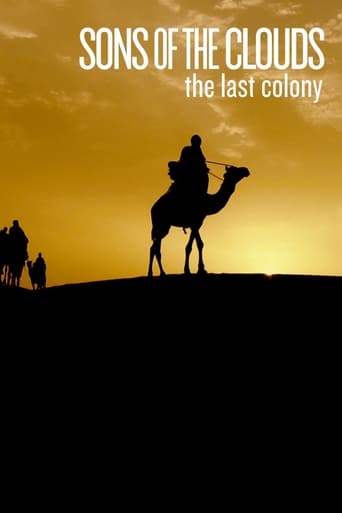

I have been pleading the Saharawi peoples cause for many years now and bardem does it too succinctly..............also showing on camera actual real speak how bad things reallyare for these abandoned people who are suffering and want to be free......just like you and me....the film examines the politics and the hows whys wherefores things became so bad and so I will leave you to watch the film and begin taking up the cause of the sufferers who need everday folk to not forget them and tell the world why and how they're suffering .I met many of them in morocco especially southern morocco Agadir...also Algeria in Algiers.I was very impressed with their way of life how humble they are and the stories of violence from Moroccan police and SURETE NATIONALE horrendous abuses attempts to break their spirits............bardem tells the story just listen and enjoy what is 81 minutes of really interesting history.
... View MoreSometimes, the best way to learn about conflicts around the world that a lot of people don't know could be a documentary film. The Sons of The Clouds is a documentary produced by Javier Bardem and directed by Álvaro Longoria, which tells the Western Sahara's story. Bardem and Longoria do an exceptional work in this film, where they try to let everyone know about the problem that began thirty seven years ago.The first time Javier Bardem went to the refugee camps of Sahara, was in 2008, drawn by the annual Fisahara, a Spanish Film Festival in one of the camps. From that moment, he fell in love with the people and started to support the saharaui cause. This film is a result of that support.The film explains that Western Sahara was a Spanish colony until 1975, when Spain abandoned it. From this moment, Morocco tried to invade this territory, and finally it could. Since that moment, 200.000 saharaui refugees live in the Algerian Sahara desert, divided in five refugee camps: Smara, Dajla, Auserd, El Aaiún and 27 de febrero. The rest of the people continued in the territory occupied by Morocco or in the small territory that it didn't invade because it wasn't good land. Both territories are separated by a 2800 Km Wall of minefields an bunkers, built by Morocco, for don't allow the refugees go back to their land. In the documentary we can see a summary of what happened in 1975, and of what has happened during all this time. With relevant material, more than 70 interviews and a simple structure which makes easy understand all the process, this film can wake up the interest about this big and unknown problem. It also shows how refugees live in their camps, how they can be happy and gentle although they have nothing. I liked this documentary because I have always pleaded the Western Sahara cause, and I think that is important for everyone to know about this conflict. There aren't a lot of films, documentaries or books about it, and maybe, if more people recognized the problem, it could be easier to do something for them. In Spain a lot of people know about that problem, because it was one guilty of what happened, although many people don't matter about it. But in other countries, as United States, if you talk about the Western Sahara problem, they'll probably answer "What is it?", as Bardem declared. So, I think that with this documentary the Spanish actor pretends to raise his voice and concern people in other countries (especially United States) about this conflict. In my opinion, the weakness of the film is that gives too much information, and if you have never heard about this topic, could be hard to follow everything. However, if you pay attention and absorb as much as possible, it can be easy to have a general idea of what is happening there. In conclusion, I recommend this documentary to all kinds of people, because it's easy to understand and interesting, and because is unfair to play down the importance to a big problem like this.
... View More